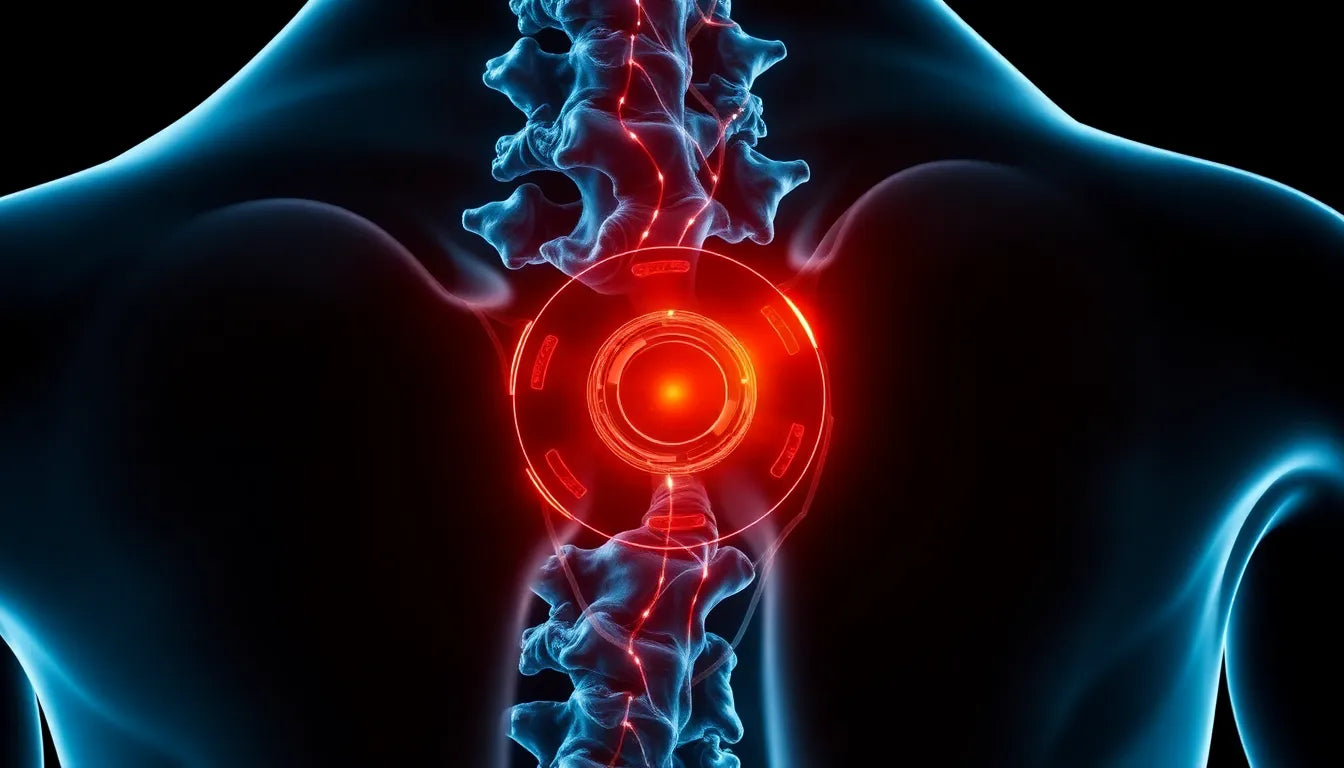Imagine this: You've been diligently following your doctor's advice for treating a herniated disc, yet the nagging back pain refuses to subside. You find yourself asking, "Why is my herniated disc not healing?" This frustrating scenario is all too common for many individuals dealing with this condition. Despite initial treatments and hopeful expectations, the road to recovery can sometimes be longer and more complex than anticipated.
Understanding herniated discs and healing expectations
A herniated disc, often referred to as a slipped or ruptured disc, occurs when the soft inner gel of a spinal disc pushes through a crack in the tougher exterior. This can lead to pain, numbness, or weakness, particularly if the herniation compresses a nerve. Typically, many people expect the discomfort to resolve within a few weeks to months, primarily with rest, physical therapy, and lifestyle adjustments. However, when healing doesn't progress as expected, it can lead to significant frustration and concern.
The path to recovery is not always straightforward. While some individuals experience quick relief, others may face persistent symptoms that linger beyond the typical healing window. This disparity can be attributed to a variety of factors, including the severity of the herniation, individual health conditions, and lifestyle choices. Understanding these underlying reasons is crucial for anyone seeking to manage their condition effectively.
The purpose of this post
This blog post aims to unravel the mystery behind why a herniated disc might not be healing as anticipated. We'll delve into the medical and biological factors that can contribute to delayed recovery, highlight signs that may indicate the need for further medical evaluation, and offer practical advice for managing symptoms. By equipping you with this knowledge, we hope to provide reassurance and empower you to take informed steps towards recovery.
In the following sections, we'll explore the complexities of herniated disc healing, examining both common and less obvious factors that might be influencing your recovery. Whether it's understanding the impact of lifestyle choices or recognizing critical red flags that warrant medical attention, our goal is to guide you through this challenging journey with confidence and clarity.
medical and biological reasons for delayed healing
While many individuals experience relief from a herniated disc within a few weeks to months, there are several medical and biological factors that can contribute to prolonged recovery times. Understanding these factors can be crucial in managing expectations and exploring further treatment options.
nerve damage and chemical irritation
One significant factor that can delay healing is nerve damage. When a herniated disc compresses a nerve, it can cause ongoing pain and discomfort. Additionally, chemical irritation from the disc material can exacerbate inflammation, further hindering recovery. Persistent nerve pressure or irritation can lead to prolonged symptoms and may require more intensive medical intervention.
severity and size of the herniation
The size and severity of the herniated disc also play a critical role in the healing process. Larger herniations can take longer to heal, as they may cause more significant nerve compression and inflammation. In some cases, severe herniations may not fully resolve without surgical intervention, although many can still improve with conservative treatment.
age-related degeneration and repeated injuries
Age-related degeneration of the spine can also impact healing. As we age, the spinal discs naturally lose hydration and elasticity, making them more susceptible to injury. Repeated injuries or wear and tear can weaken the discs further, complicating recovery from a herniation. For older adults, healing may be slower, and symptoms might persist longer than in younger individuals.
blood supply and inflammation
Adequate blood supply is essential for healing, as it delivers necessary nutrients and oxygen to the affected area. Poor circulation can impede this process, prolonging recovery times. Additionally, ongoing inflammation can prevent the body from repairing the damaged tissue effectively. Addressing these issues through lifestyle changes or medical treatment can help improve healing outcomes.
lifestyle factors and rare causes
Lifestyle factors such as smoking, poor nutrition, and lack of physical activity can significantly impact the healing process. Smoking, in particular, reduces blood flow and can exacerbate disc degeneration. Moreover, rare causes like connective tissue disorders or congenital factors may also play a role in delayed healing. Identifying and addressing these underlying issues is crucial for recovery.
signs and red flags that healing is not occurring
It's important to recognize the signs that may indicate your herniated disc is not healing as expected. These red flags can help you determine when to seek further medical evaluation or adjust your treatment plan.
persistent pain and neurological symptoms
If you continue to experience pain beyond the typical 4-6 week healing window, it may be a sign of underlying complications. Additionally, increasing neurological symptoms, such as numbness, tingling, or weakness, can indicate that the herniated disc is not resolving. These symptoms warrant prompt medical attention to prevent further damage.
urgent symptoms and quality of life
Urgent symptoms, such as loss of bladder or bowel control, require immediate medical evaluation, as they may indicate a serious condition like cauda equina syndrome. Furthermore, if your quality of life is not improving, and daily activities remain challenging, it may be time to reassess your treatment approach.
recovery timeline and expectations
Understanding the recovery timeline and setting realistic expectations can help you navigate the healing process more effectively. Most herniated discs improve with conservative care, including rest, physical therapy, and lifestyle changes, within a few weeks to three months. However, it's important to note that even severe herniations can improve over time, though full structural healing may not always occur.
As inflammation subsides and the disc bulge reduces, symptoms often decrease, allowing for improved function and quality of life. By staying informed and proactive in your recovery, you can better manage your symptoms and work towards a successful outcome.
Lifestyle and self-management strategies for herniated disc recovery
While medical treatments provide a foundation for healing a herniated disc, incorporating lifestyle and self-management strategies can significantly enhance recovery. These approaches focus on supporting the body's natural healing processes and improving overall well-being.
Active recovery and rehabilitation
Engaging in an active recovery process is crucial for managing a herniated disc. While rest is important, staying active within your comfort limits can promote healing. Physical therapy exercises tailored to your condition can strengthen the muscles supporting the spine, reduce pressure on the herniated disc, and improve flexibility. Adhering to a rehabilitation program can help you regain function and prevent future injuries.
Diet and nutrition
A balanced diet plays a vital role in supporting the body's healing processes. Consuming a variety of nutrients, including vitamins and minerals, can aid tissue repair and reduce inflammation. Foods rich in omega-3 fatty acids, such as fish and flaxseeds, have anti-inflammatory properties that can be beneficial. Additionally, maintaining a healthy weight can alleviate stress on the spine, further promoting recovery.
Avoiding harmful habits
Eliminating harmful habits, such as smoking, is essential for optimal healing. Smoking reduces blood flow, impairing the delivery of nutrients and oxygen necessary for tissue repair. Additionally, ensuring adequate sleep is crucial, as it allows the body to recover and regenerate. Establishing a consistent sleep schedule and creating a restful environment can improve sleep quality and support the healing process.
Mental health and stress management
Managing stress and maintaining good mental health are important components of recovery. Chronic pain can lead to anxiety and depression, which may exacerbate symptoms and hinder healing. Mindfulness practices, such as meditation and deep breathing exercises, can help reduce stress and promote relaxation. Seeking support from mental health professionals or support groups can also provide valuable coping strategies.
Frequently Asked Questions
How long does it take a herniated disc to heal?
Typically, a herniated disc heals within 4-6 weeks. However, recovery time can vary based on individual factors such as the severity of the herniation and overall health. Some cases may take longer, requiring ongoing management to alleviate symptoms.
What can I do if my disc isn’t healing?
If your herniated disc isn't healing as expected, consult a healthcare provider for further evaluation. They may recommend additional diagnostic tests or alternative treatments. Additionally, consider lifestyle adjustments, such as incorporating physical therapy, improving nutrition, and quitting smoking, to support recovery.
When should I seek medical help for my herniated disc?
Seek medical help if your symptoms persist beyond the typical healing period or worsen. Urgent symptoms, such as loss of bladder or bowel control, require immediate medical attention. If you experience increasing pain, numbness, or weakness, consult a healthcare professional to explore further treatment options.
Can lifestyle changes really impact the healing process?
Yes, lifestyle changes can significantly influence the healing process. Factors like a balanced diet, regular exercise, and avoiding smoking can enhance the body's ability to repair and recover. These changes can also prevent future injuries and improve overall health.
Is it possible for a herniated disc to heal without surgery?
Yes, many herniated discs improve with conservative treatment and lifestyle modifications. Surgery is typically considered only when conservative measures fail to alleviate symptoms or if there are severe complications. Most individuals experience symptom relief and improved function through non-surgical approaches.
By understanding the factors that influence herniated disc healing and taking proactive steps to manage your condition, you can work towards a successful recovery. Remember, each individual's journey is unique, and seeking professional guidance is essential for personalized care.
Sources
- University of Maryland Medical Center. "Herniated Disc."
- Cleveland Clinic. "Herniated Disc: Symptoms, Causes, and Treatments."
- More Good Days. "Understanding Herniated Disc Recovery."
- Spine MD. "Herniated Disc: Causes and Treatment Options."
- NCBI/StatPearls. "Herniated Lumbar Disc."
- HT Physio. "5 Reasons Your Herniated Disc Isn't Healing" (YouTube).
























